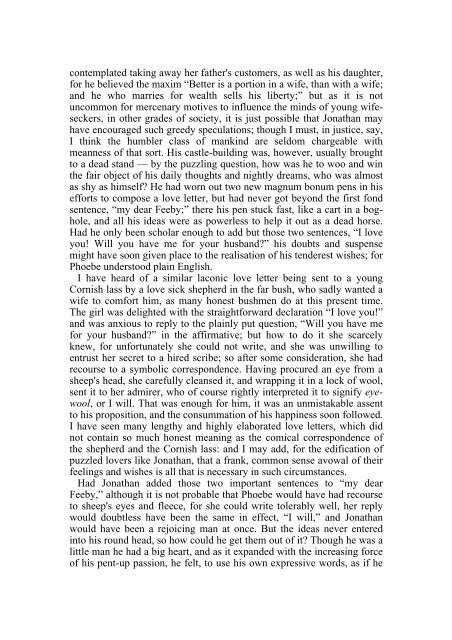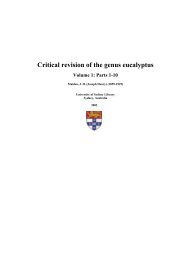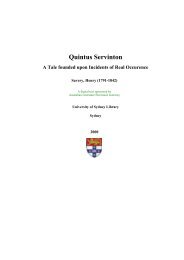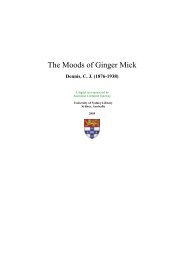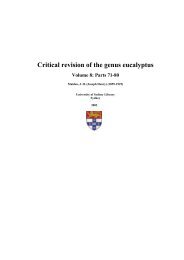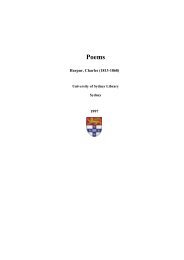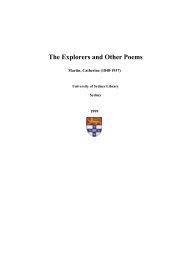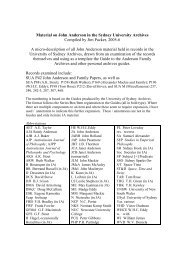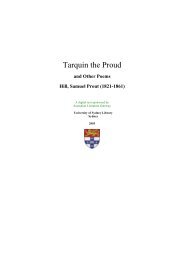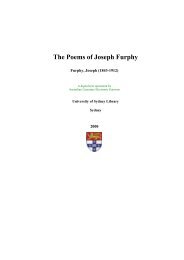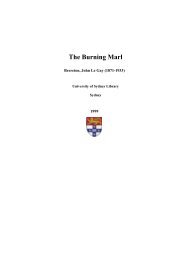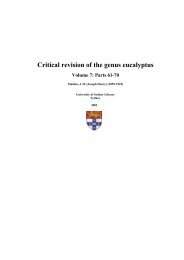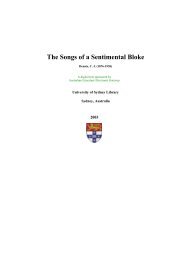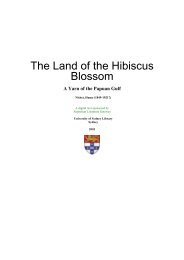- Page 1 and 2:
Australian Tales and Sketches From
- Page 3 and 4:
Preface. MOST of the following tale
- Page 5 and 6:
Mr. Phiggs and His Christmas Breakf
- Page 7 and 8:
of cooking a potato, or a red herri
- Page 9 and 10:
shells, and a variety of other refu
- Page 11 and 12:
window, and being furnished with bu
- Page 13 and 14:
Speaking a Word in Season. SOME tim
- Page 15 and 16:
gooseberry. “I don't think that w
- Page 17 and 18:
satisfaction. As they usually had a
- Page 19 and 20:
A Matrimonial Juggler; OR, MR. TEDD
- Page 21 and 22:
his hand to his back so frequently,
- Page 23 and 24:
“Led go id I dell you!” he crie
- Page 25 and 26:
hurry with your reply.” Charity l
- Page 27 and 28:
niver fear — that is iv he's able
- Page 29 and 30:
head put in a sack, an' sarve ye ri
- Page 31 and 32:
luck wud have it, I wint on board t
- Page 33 and 34:
Joey Goosgog and Jasper Spindle's T
- Page 35 and 36:
tittle to me which side I sit, I ca
- Page 37 and 38:
say I could drive a horse. Somethin
- Page 39 and 40:
they had lighted a fire on a rock,
- Page 41 and 42:
that's all. He isn't worth much. Ug
- Page 43 and 44:
can't see nobody.” Mr. Spindles,
- Page 45 and 46:
outrage, you cowardly villain. We a
- Page 47 and 48:
the utter bewilderment of poor Mrs.
- Page 49 and 50:
you, for I know her history well. I
- Page 51 and 52:
willingly choose this delicate and
- Page 53 and 54:
called to upbraid her, as some of h
- Page 55 and 56:
luxury to me. Disease, delirium, ma
- Page 57 and 58:
gooseberry?” He is sixty-five yea
- Page 59 and 60:
for a lass of seventeen to be very
- Page 61 and 62:
iron and the marking ink. Excuse me
- Page 63 and 64:
“Did you though?” exclaimed Mrs
- Page 65 and 66:
make hair grow on a marrow-bone. Ha
- Page 67 and 68:
a life of misery, but you have made
- Page 69 and 70:
months; indeed, I was subject to pe
- Page 71 and 72:
Grinn's brain was rather over-taxed
- Page 73 and 74:
Don't Lie Down and Fret. ONE aftern
- Page 75 and 76:
he would probably never take the tr
- Page 77 and 78:
have upon the soils of some parts o
- Page 79 and 80:
slightest resistance. She is struck
- Page 81 and 82:
am not sure about that, but never m
- Page 83 and 84:
so than I had been six or seven yea
- Page 85 and 86:
monkey, or I shall kick you into th
- Page 87 and 88:
“Next day I went to London, with
- Page 89 and 90:
they often afford more ease than a
- Page 91 and 92:
of my life, and the prop and suppor
- Page 93 and 94:
Chapter IV. “As I before remarked
- Page 95 and 96:
way of setting him up in the world
- Page 97 and 98:
set me laughing; the next minute I
- Page 99 and 100: dial warns us to bed. To concentrat
- Page 101 and 102: and in turning over a waste-paper b
- Page 103 and 104: “You have no idea how that cheere
- Page 105 and 106: an opinion of her sense to believe
- Page 107 and 108: have been the dernier ressort, as i
- Page 109 and 110: Wife! what better friend have you i
- Page 111 and 112: Widow Giles's Little Grocery Shop.
- Page 113 and 114: short pause, and in a tone which pl
- Page 115 and 116: upon doing something noble. “I ca
- Page 117 and 118: Commercial Hobgoblins. IN the cours
- Page 119 and 120: good customers display in these dis
- Page 121 and 122: “I did put it in my bank yesterda
- Page 123 and 124: that would certainly damage me.
- Page 125 and 126: and had scarcely strength enough to
- Page 127 and 128: altogether, sooner than suffer such
- Page 129 and 130: How the Knipps Family Kept “Merry
- Page 131 and 132: chicken and a brown loaf; a plum pu
- Page 133 and 134: catching a crab, with his heels in
- Page 135 and 136: “It is not all your fault, Bill,
- Page 137 and 138: “The noise was stunning, and at f
- Page 139 and 140: of virtue and wisdom, which he has
- Page 141 and 142: Influenza Season. Scene: Sydney, Ki
- Page 143 and 144: increase his surgical practice,”
- Page 145 and 146: Into each life some rain must fall.
- Page 147 and 148: “Is anything troubling you, my de
- Page 149: him. Scarcely has the poor widow re
- Page 153 and 154: with pearl buttons. “I'm much obl
- Page 155 and 156: Jonathan made many admiring comment
- Page 157 and 158: courteous, however, thus plainly to
- Page 159 and 160: extra smart, and putting (with his
- Page 161 and 162: to the prejudice of his sobriety, o
- Page 163 and 164: The magpies, which perched on the s
- Page 165 and 166: number of genteel residents of the
- Page 167 and 168: down beside the hedge, I want to sa
- Page 169 and 170: fellows who ought to be ashamed of
- Page 171 and 172: all vind out whether her be's a fit
- Page 173 and 174: Shrugs. “OF course you know Mr. A
- Page 175 and 176: stimulus, the dread of losing their
- Page 177 and 178: “Joy Cometh in the Morning.” TH
- Page 179 and 180: staysails, exposed all the time to
- Page 181 and 182: I was glad, too, for the safety of
- Page 183 and 184: The poor little tailor certainly lo
- Page 185 and 186: Angry and hungry boys and girls are
- Page 187 and 188: “Shove It on Board.” “LET go
- Page 189 and 190: perplexed, and muttered that he “
- Page 191 and 192: wonder that you did so.” “Well,
- Page 193 and 194: table, when I re-entered the saloon
- Page 195 and 196: fore sheet aft! Port the helm!” I
- Page 197 and 198: in these days of active opposition,
- Page 199 and 200: at the idea of soon seeing a living
- Page 201 and 202:
Goliah, taking the reins from the w
- Page 203 and 204:
at cousin Goodwin's, the widow made
- Page 205 and 206:
Mr. M'Faddle's Pic-Nic Party. THAT
- Page 207 and 208:
provisions, a keg of water, and sun
- Page 209 and 210:
from north west are usually the pre
- Page 211 and 212:
in the boat (which was a man-of-war
- Page 213 and 214:
the pleasure of your society, and t
- Page 215 and 216:
hope you will make a valuable use o
- Page 217 and 218:
oard, when Captain Gimble, glisteni
- Page 219 and 220:
coasting seamen are mercilessly exp
- Page 221 and 222:
usually as thick as tanner's refuse
- Page 223 and 224:
eccentricities which often interfer
- Page 225 and 226:
come again, that they might be look
- Page 227 and 228:
to see if it is sound; look at it a
- Page 229 and 230:
Gone to Heaven. A BELOVED friend of
- Page 231 and 232:
and summoning up his good-tempered
- Page 233 and 234:
it, that's what I mean. But cheer u
- Page 235 and 236:
Mrs. Lemonpip had seated herself on
- Page 237 and 238:
consequence than an old barrow with
- Page 239 and 240:
She lived upon nothing but victuals
- Page 241 and 242:
poor thing too.” “Well, well, m
- Page 243 and 244:
as sound as new saucepans. He was s
- Page 245 and 246:
in her right ear, and she was lying
- Page 247 and 248:
wife, and a respected landlady, in
- Page 249 and 250:
“Pooh! a great big goose!” snee
- Page 251 and 252:
unknown assailant, like a kangaroo
- Page 253 and 254:
his wife and his attic lodger, unti
- Page 255 and 256:
smiles of bygone days returned to h
- Page 257 and 258:
and went on deck to take a look at
- Page 259 and 260:
elieve there is no luck in sailing
- Page 261 and 262:
said the captain, laughing till his
- Page 263 and 264:
Fire! Fire! Fire! I HAVE vivid reco
- Page 265 and 266:
good his loss. Pooh! what next?”
- Page 267 and 268:
Little Strangers. LIVES there an ho
- Page 269 and 270:
stimulating influence on my whisker
- Page 271 and 272:
under my arm. But I felt as fidgety
- Page 273 and 274:
my meagre description of that happy
- Page 275 and 276:
morning, for I tartly remarked, ‘
- Page 277 and 278:
you should have seen the animated f
- Page 279 and 280:
children, by giving them everything
- Page 281 and 282:
Jack Tars, Ahoy! HEAVE to, my heart
- Page 283 and 284:
wheel, in this frightfully heavy se
- Page 285 and 286:
have a good ship and a good offing,
- Page 287 and 288:
A Crippled Ship with a Wrangling Cr
- Page 289 and 290:
knocked to pieces on the rocks.”
- Page 291 and 292:
That is a pleasing picture; but as
- Page 293 and 294:
I drew out my purse, but found that
- Page 295 and 296:
landlord or his agent, demanding a
- Page 297 and 298:
Micky Mahony's Mishaps. Chapter I.
- Page 299 and 300:
joke to be robbed of his all. “Ni
- Page 301 and 302:
ullet ye'd murther me wid, that's a
- Page 303 and 304:
fandangoes from the tea-tree scrub
- Page 305 and 306:
very carefully, for he was not accu
- Page 307 and 308:
pipe whin he blow'd me brains out,
- Page 309 and 310:
counthry as knows more nor I do abo
- Page 311 and 312:
heard, when I got back to the stati
- Page 313 and 314:
your sins, and give you grace to wa
- Page 315 and 316:
that I wasn't a sheep too. But, pra
- Page 317 and 318:
“THAT'S a raal jintleman, God ble
- Page 319 and 320:
them asked Micky what he wanted wit
- Page 321 and 322:
utterly disregarded, while his resi
- Page 323 and 324:
seed, Joe; it was a muckle thief, t
- Page 325 and 326:
prior to remanding it to a future d
- Page 327 and 328:
go to, here,” said Micky, laying
- Page 329 and 330:
“Light Weights” and “Short Le
- Page 331 and 332:
lengths, and forged marks, are as c
- Page 333 and 334:
“Don't Mention It.” “I WOULD
- Page 335 and 336:
drawing pupils of an evening. Her o
- Page 337 and 338:
God, and to lead a ‘sober, righte
- Page 339 and 340:
Down in the Pit. “I FEAR that the
- Page 341 and 342:
stay to examine. Turning round a ru
- Page 343 and 344:
Boys and Girls! Beware of Snakes!
- Page 345 and 346:
long shelly beach like avalanches,
- Page 347 and 348:
again, and forced the jagged end of
- Page 349:
vice, poverty, disease, and an agon


